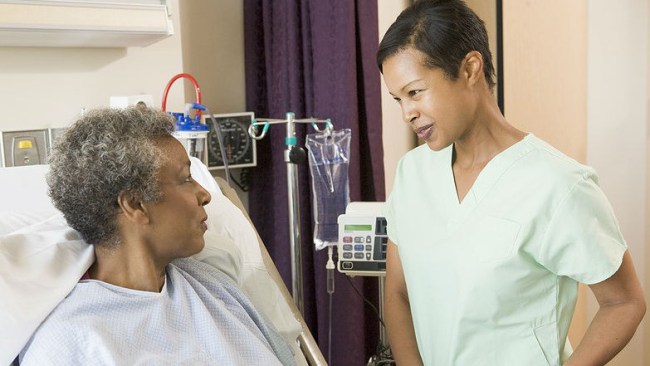
www.bwhi.org
The “OTHER” Cancer and Black women
Cervical cancer affects more than 11,000 women worldwide annually. Of the close to 2,000 Black women diagnosed with cervical cancer each year, over 40 percent will die. This is unacceptable. Cervical cancer is one of the most preventable types of cancer, and women can be screened for it with routine Pap tests. Despite this fact, the American College of Obstetricians and Gynecologists (ACOG) is now recommending women begin cervical cancer screening at age 21, instead of 3 years after the onset of sexual activity, as was previously recommended by the group. Cervical cancer is almost always caused by genital human papillomavirus (HPV) infection. HPV can also lead to cancers of the anus, vulva, vagina, throat and penis.
Why is this Important to Black Women?
Based on surveys conducted by the Black Women’s Health Imperative (Imperative), we found that a majority of Black women are familiar with certain facts about cervical cancer –how it is caused and that it is preventable. Yet we are still dying at a disproportionately higher rate. Although cervical cancer occurs most often in Hispanic women, Black women tend to have lower 5-year survival rates and die more often than any other race. In fact, Black women have twice the cervical cancer mortality rate compared to white women.
While the Imperative, like ACOG, encourages women to be informed about the risks and benefits of any procedure, the fact remains that most cervical cancer deaths occur among women who have never been screened or have not been screened in the past five years. While we share ACOG’s concerns on the affects of overtreatment and the social and economic toll they may place on women, particularly young women, we also know that screening and early detection are critical components in eliminating these disparate health outcomes for Black women and other women of color.
What Black Women Need to Know
Cervical cancer may be prevented through the HPV vaccine or treated if detected early by a regular Pap test. If abnormal cells caused by HPV are found while they are still pre-cancerous, they can be treated before they progress into cancer. This is why it’s important for all women to have a regular Pap test, and for women 30 and older (the group most at risk) to routinely be tested for HPV as well.
If it is detected early, cervical cancer is one of the most successfully treatable cancers which is why it is important to know and understand the risk factors for developing cervical cancer. Please refer to our Cervical Cancer & Black Women Fact Sheet, click here. Early cervical cancer generally shows no signs or symptoms. This is why regular screening is so important. A woman may develop symptoms only when the cancer has become invasive and spreads to nearby tissue. When this happens, the most common symptoms are: abnormal vaginal bleeding; unusual discharge from the vagina (separate from your normal menstrual period); bleeding following intercourse, douching, or after a pelvic exam; and pain during intercourse.
What the Imperative is Doing
The Imperative supports Black women in knowing and understanding all the important facts related to this deadly but preventable cancer. Through our efforts we strive to ensure that screening and treatment guidelines are designed to meet the specific needs of Black women and that they are responsive to the trends we are seeing in cervical cancer rates among Black women.
Our work strives to achieve health equity in access, early detection and timely diagnosis and treatment by:
- Ensuring that Black women have access to timely screening and early detection services in the communities in which they reside
- Connecting Black women to the health care delivery system in order to receive important routine medical care
- Exploring what is known about cervical cancer health disparities among Black women
- Helping to identify the social determinants that contribute to the growing cervical health care disparities between Black women and others
- Applying the most promising community-driven, evidence and practice-based interventions that will achieve the greatest impact in reducing these disparities
- Increasing individual knowledge about cervical cancer
- Participating in national and community coalitions and partnerships
- Promoting screening as an essential benefit in health reform
To learn more about our specific programs, click here.
What Black Women Can Do
The American Cancer Society recommends that:
- All women should begin cervical cancer screening within three years after they start having sex and no later than age 21, and screening should be done every year with a regular Pap test.
- Beginning at age 30, women who have had 3 normal Pap test results in a row may get screened every 2 to 3 years. Women older than 30 may also get screened every 3 years with either the conventional or liquid-based Pap test, plus the human papilloma virus (HPV) test.
- Women 70 years of age or older who have had 3 or more normal Pap tests in a row and no abnormal Pap test results in the last 10 years may choose to stop having cervical cancer testing.
- Women who have had a total hysterectomy (removal of the uterus and cervix) may also choose to stop having cervical cancer testing, unless the surgery was done as a treatment for cervical cancer or pre-cancer.
- Women who have had a hysterectomy without removal of the cervix (a supra-cervical hysterectomy) need to continue cervical cancer screening and follow the guidelines above.
Cervical Cancer News
BIRMINGHAM, AL (WBRC) –
A Missouri state jury awarded a Birmingham woman’s family $72 million in damages from Johnson & Johnson after finding the company liable for injuries from her decades-long use of talc-based products such as Johnson’s Baby Powder and Shower to Shower.
Tarrant resident Jacqueline Fox died of ovarian cancer at age 61 in October 2015. She had used the talc-based products for more than 35 years. She was diagnosed with cancer two years ago.
While she died months before the trial began, her son said she insisted they pursue the case.









